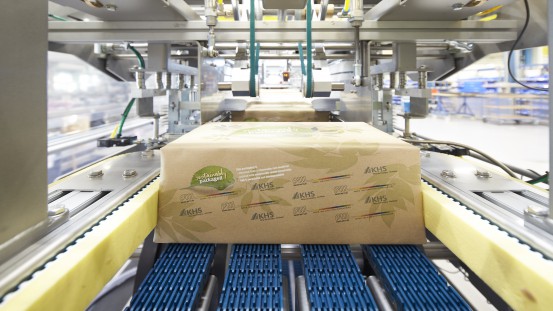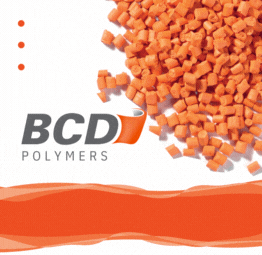The idea of using paper as a secondary packaging is not new; KHS first experimented with this around 20 years ago. “Back then, this technology didn’t catch on, however, as paper was a cost-intensive raw material and wrapping containers in film yielded better results regarding stability,” says Karl-Heinz Klumpe, packaging product manager at KHS. The beverage industry thus opted for different systems and solutions. “Our customers now want alternatives to the usual packaging systems such as film. These should be as ecofriendly as possible,” he continues. To this end, the paper wrapping has now been developed together with an international beverage producer. This type of pack can replace shrink film or wrap-around carton packaging for transportation or sale on packs of 12 or 24 cans in the high-capacity range of up to 90,000 cans per hour.
Few process adjustments thanks to modular machine design
In order to wrap cans in paper instead of film just a few adjustments are needed to the Innopack Kisters tray packer, a machine well established on the market. “KHS is increasingly supplying modular systems and solutions that enable and ease the appropriate conversions to our machines. In this case, we’ve simply reengineered the process module for folding and wrapping,” Klumpe explains. “The standard components such as tray separation from the magazine, gluing or can feed are identical to those on the hundreds of proven KHS machines already on the market.” This allows beverage producers to have the tray packers already in operation at their plants converted simply by adapting certain modules, making a full new investment unnecessary.
Wrapping cans in paper has many advantages over other materials, believes Klumpe. “On the one hand, paper is kinder to the environment than film with respect to ocean pollution, for instance. Paper biodegrades in the environment after a few weeks.” On the other hand, fewer packaging materials are used. Instead of a sturdy wrap-around carton or film packs on trays, packaging cans in thinner paper only needs a flat, stable corrugated card pad as a base – with identical results regarding stability.
Costs are also cut by the new paper pack: compared to a wrap-around carton by up to 15%, with outgoings about the same as for film. Overheads are also considerably reduced by the low energy consumption of about 14 kWh an hour at 80 cycles a minute. The folding process is such that the pack is also fully enclosed. “In contrast, dirt can get into film packs with small side openings. Over long distances especially paper has the clear advantage when it comes to protecting the pack,” Klumpe states.
Great interest from the beverage industry
Klumpe sees huge potential for the new KHS technology. “When I think how much food is canned all over the world, with our paper pack we offer a useful alternative to conventional secondary packaging. With our system we can significantly help to cut down on the amount of plastic waste being generated.” According to Klumpe, this will support the efforts being made throughout the entire sector to protect the environment. “Sustainability is also always a cost factor, however. With our new approach we’re catering for both aspects here.”



